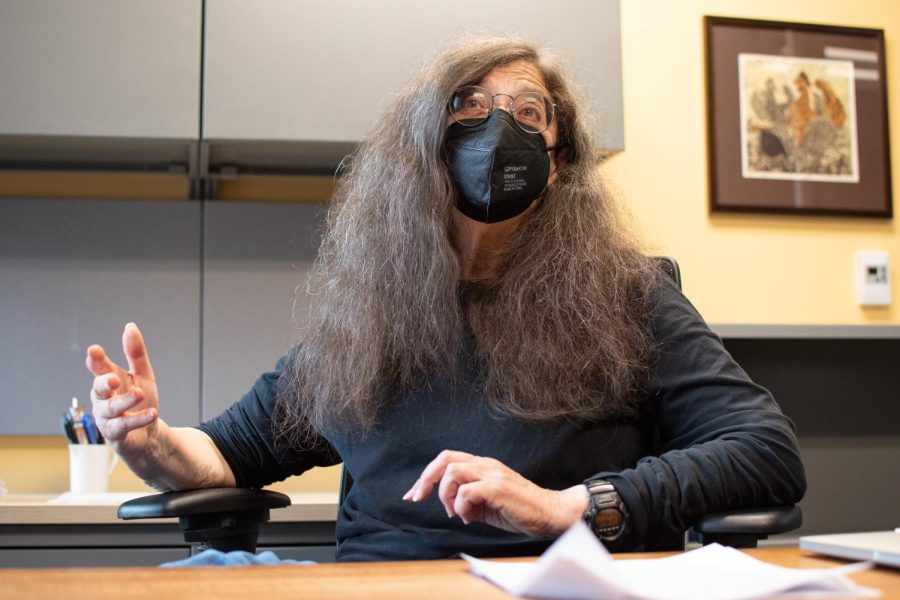Center for Advanced Study begins year-long initiative on misinformation
May Berenbaum, head of the entomology department and director for the CAS, speaks about a year-long initiative on misinformation the Center for Advanced Study has recently begun working on.
Oct 28, 2021
The Center for Advanced Study has begun a year-long initiative on misinformation, conspiracy theories and the infodemic. The initiative, which began on Sept. 30, is a series of Zoom sessions where professors work to identify the themes of misinformation.
May Berenbaum, head of the entomology department and director for the CAS, describes an infodemic as false information spreading rapidly, like a disease. Berenbaum says that the infodemic is not unique to the U.S.
“We don’t have an immune system against deception or wise conspiracy theories, or if we do, it’s too subtle to have been well characterized or to be implemented on demand,” Berenbaum said. “That’s what we need. We need to figure out ways to counter these runaway rumors.”
They hope that this initiative will have long-term impacts.
“I hope that collectively we can come up with recommendations or even actions right here on campus that will help us communicate effectively to skeptics or people actively hostile to science,” Berenbaum said.
Get The Daily Illini in your inbox!
This initiative began through Masumi Iriye, CAS deputy director.
“I think conspiracy and misinformation would be a really interesting topic to cover but I didn’t want it to just be about crazy politics; I wanted it to be more serious,” Iriye said.
Through networking, Iriye was able to form a strong core group of people to start the fall semester with. Professors such as Mira Sotirovic, Brant Houston and Nikki Usher are all participating.
When Berenbaum became the director of the center, one of her conditions of taking that position was to get the Office of the Provost’s support in using CAS professors in a more fundamental way.
Berenbaum listed combating misinformation as something the CAS professors could help with.
“So, it was a series of really great coincidences,” Iriye said.
Rejecting expertise has occurred among the public, and Berenbaum and Iriye have noticed this trend.
“Just about every area of academic accomplishment now encounters resistance from some segments of the population,” Berenbaum said. “How did this happen? And what can we do to stop this? And increase people’s trust in expertise and knowledge?”
The fall semester is all Illinois faculty. In the spring, there will be guest speakers that Berenbaum and Iriye invite to campus.
“This fall is kind of historical and more (on) the end of social science and humanities, we’re going to focus more in the spring on some of the scientific untruths or misinformation campaigns or disinformation,” Berenbaum said.
Misinformation is spread mainly through like minded individuals. Group identity increases the spread of misinformation.
The spreading of misinformation is not new. In this initiative, there will be research of history to remind people and provide examples of when the public was manipulated.
“The consequences of embracing misinformation and endorsing conspiracy theories can be death,” Berenbaum said.
Iriye says that this can be seen with “The Protocols of the Elders of Zion,” which is a fabricated text based on a French satirical piece. It was then turned into a text that was used by the neo-Nazis and Hitler to justify the extermination of the Jews.
“So there’s an example of when a conspiracy theory, misinformation campaign had absolutely devastating and concrete results. I mean this is what happens when it runs unchecked,” Iriye said.
Social media and technology has aided in spreading false information. This infodemic has led to a weakened trust in journalists and news sources.
Iriye believes that it’s healthy when a story is revealed to be fabricated. “…there’s this collective, how can we make sure this never happens again? I think it’s good to have this periodic cleansing and (recalibration) and not just trying to hide it.”
Iriye said that media outlets and the audience need to do better in consuming and producing information.
“The retraction and correction are much harder to disseminate than the actual misinformation from the initial publication,” Berenbaum said. “There’s something in our nature that makes it hard for us to let go of some finding that agrees with our worldview. We just are reluctant and we (need) to be less attached to things and make decisions based on evidence.”
In the future, the CAS is looking into having speakers discuss artificial intelligence and involving the artificial intelligence community.
“This is a way to encourage collaboration or at least cross-disciplinary talking, which usually leads to interesting new pathways towards suggesting solutions,” Iriye said.
At the end of the spring semester, Berenbaum and Iriye hope to be able to recommend actions on campus that will lead to better communication.
“Our campus did do so well responding to the COVID-19 epidemic. I’m hoping we can mount a similar response to mitigate this infodemic,” Berenbaum said.






